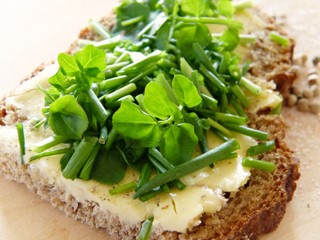How to use watercress in the kitchen

Popular in the diet of Roman soldiers centuries ago, watercress is now enjoying a strong resurgence in modern kitchens.
In previous articles, we’ve covered how to grow watercress and how to care for it. In this article, we’ll talk about what to do with it after harvest.
How to store and prepare watercress
Watercress is best consumed fresh, but you can keep it for a few days with proper storage.
- Wrap the unwashed leaves in a damp paper towel and store them in a plastic bag in the fridge. This helps maintain moisture and prevents wilting.
- Use the leaves within 2-3 days for optimal freshness and flavor.
Preparation tips:
- Rinse watercress thoroughly under cool water before using. The delicate leaves can trap dirt or grit, especially if grown in outdoor conditions.
- Trim any thick stems or roots that may be too tough, especially when using watercress in raw dishes like salads.
Culinary uses for watercress
Watercress is a versatile green that enhances a variety of dishes. It adds a punch of flavor and nutrients, perfect for those looking to add more greens to their diet.
- Salads: Its peppery flavor stands out in salads, offering a unique contrast to other mild leafy greens.
- Tea sandwiches: In Europe, watercress is a classic ingredient for tea sandwiches, paired simply with butter on soft bread.
- Soup garnish: The crisp, peppery bite makes it an excellent garnish for creamy soups or broths.
- Smoothies: Blend watercress into smoothies as a substitute for spinach or kale for a peppery kick and an extra dose of vitamins.
- Mustard substitute: Use it in recipes calling for mustard greens—its flavor profile offers a similar sharpness and depth.

Pairing watercress with other foods
Watercress pairs well with many flavors, making it an excellent ingredient to experiment with in the kitchen.
- Proteins: Complements roasted meats like beef, lamb, and chicken, as well as seafood.
- Cheese: Its sharpness works well with creamy cheeses like goat cheese, feta, or even cream cheese.
- Citrus: The acidity of lemon or lime enhances its peppery taste, particularly in salads or garnishes.
- Other greens: Combine with milder greens like spinach or arugula for a varied flavor in salads or smoothies.
Watercress recipe ideas
Here are some simple ways to incorporate watercress into everyday meals:
Watercress salad with lemon vinaigrette

Lemon vinaigrette (serves 2):
- 2 tablespoons freshly squeezed lemon juice
- Sea salt and pepper to taste
- 3 to 4 tablespoons extra-virgin olive oil
Salad (serves 2):
- 2 cups or handfuls watercress
- Optional: pitted olives
- Optional: crushed nuts/seeds to top
Instructions:
-
In a small bowl or food processor, whisk together the lemon juice, mustard, and sea salt until mixed well.
-
Add 3 tablespoons of the oil slowly, while mixing constantly until the dressing is well blended. Season with sea salt and pepper and any other spices you’d like.
-
Lightly rinse off any dirt and shake or pat watercress dry. Snip the stems with leaves off roots (if attached) and disccardany thick stems that may be tough to eat, keepingg thin stems. (both are edible!)
-
Then, dress watercress with the vinaigrette, and serve as a side or base to your favorite protein.
Source: Food by Mars
Creamy watercress soup

This recipe by chef Giangi serves four people.
Ingredients (serves 4):
- 2 bunches watercress
- 3 medium potatoes, peeled and cut into small dice
- 1 tablespoon unsalted butter
- 3 cups vegetable broth, or chicken broth
- 1 bay leaf
- 4 tablespoons heavy cream
- salt and pepper, to taste
- creme fraiche, or sour cream
Instructions:
- Rinse the watercress well and roughly chop it
- In a large pot, melt the butter over medium heat and add the chopped watercress. Cook for 3 minutes: add the potato cubes, bay leaf, salt, and pepper, and add chicken stock to cover the watercress and potatoes.
- Bring to a boil and lower to a simmer over medium-low heat for about 20 minutes. Partially cover the pan.
- Remove the bay leaf, and with a handheld mixer or in a blender and reduce a smooth, creamy puree.
- Put the watercress puree back into the cooking pan, if you were using the blender, and add the heavy cream and stir well to integrate it. Lower the heat and warm up the soup, do not boil it. Taste and season accordingly.
- Serve with a dollop of heavy cream or sour cream.
Source: Giangi’s Kitchen
Egg and watercress sandwich

Ingredients (serves 4):
- 4 large eggs
- 4 tablespoons herbed butter, or unsalted butter, softened
- 4 tablespoons mayonnaise, or mayonnaise alternative
- Kosher salt, to taste
- Freshly ground black pepper, to taste
- Paprika, to taste
- 8 slices bread, divided
- 1/2 cup fresh watercress, chopped
- Parsley, chopped, to taste, optional
Instructions:
- Hard-boil the eggs, rinsing them in cold water when they are done.
- While still warm, peel and mash eggs with butter, using a potato masher or a fork.
- Stir mayonnaise, salt, pepper, and paprika into egg mixture.
- Spread egg salad onto 4 slices of the bread.
- Add watercress and parsley, if using.
- Top watercress with remaining 4 slices of bread.
- Remove crusts and slice sandwiches twice, diagonally, to make 4 tea sandwiches from each large sandwich.
Source: The Spruce Eats
Watercress smoothie

Ingredients (serves 2):
- 1 Galia melon, quartered with pips and peel removed
- 2 pears, peeled, quartered and cored
- 85g watercress
Instructions:
- Cut the melon flesh into bite sized pieces.
- Feed all of the fruit and watercress through a juicer and pour into two glasses.
- Stir and drink immediately.
Source: Watercress.co.uk
Health benefits of watercress
Watercress plants are a nutritional powerhouse, providing a high density of essential vitamins and minerals:
- Vitamins A, B1, B3, C, and K: These vitamins are key for immune health, skin regeneration, and blood clotting.
- Iron, potassium, and calcium: Watercress is rich in minerals that support muscle function, bone health, and overall vitality.
- Antioxidants: Packed with carotenoids like beta-carotene, lutein, and zeaxanthin, watercress helps combat oxidative stress, reducing the risk of chronic diseases.
Watercress is especially rich in glucosinolates, compounds that release indoles and isothiocyanates when chopped or chewed. These compounds are linked to reduced cancer risks and other health benefits.
